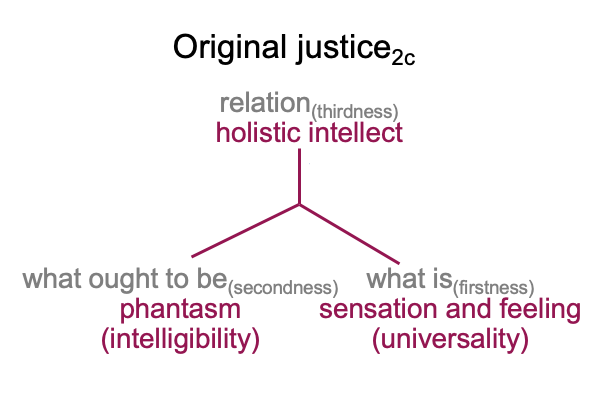0073 Now, I return to the challenge at hand. If the holistic intellect (relation) associates to thirdness, then what about the categorical assignments to what ought to be and what is.
Well, since I expect sensation and feeling to be open to nature’s significations, as well as our own manual-brachial hand talk, what is should go with firstness. The assignment fits the iconic and indexal semiotic properties of natural signs and hand talk. The match also fits the notion that what is is weighed on the basis of universality.
0074 That leaves what ought to be with the category of secondness. This assignment means that phantasms are so imbued with actuality that they are subject to the logic of noncontradiction. In other words, phantasms are subject to correction. What ought to be is weighed on the basis on intelligibility.
0075 These assignments circle back to the relation, in thirdness, called “the holistic intellect”. A holistic intellect parallels a rational intellect, which also weighs intelligibility and universality. At the same time, this parallel-to-rational intellectis more than rational, because intelligibility comes with grace and universality is preternatural.
A holistic intellect is greater than the sum of its parts.
Plus, I am no longer using the term, “original justice”, twice.
How does that smell?
My nose tells me that the turtle is starting to rot.
Maybe, it just pooped.
0076 Here is a picture of original justice2c, as formulated in this discussion.

0077 Original justice2c is a judgment, appearing in a divine, suprasubjective interscope.
Do I have that correct?
Is original justice2c also a judgment characterizing human subjectivity?
The perspective-level actuality2c seems to go into both boxes.
0078 It2c is sort of scientific. Evolutionary psychology depends on cognitive psychology’s observations and measurements of sensations and feelings2a in response to stimuli.
In these experiments, stimuli act as sign-vehicles, then sensations and feelings2a constitute sign-objects. We humans are attuned to sign-relations.
Can scientists study human responses to signs? Cognitive psychologists can observe and measure our sensations and feelings2a, but they cannot detect our phantasms2b. They cannot use stimuli to trigger our imaginations1b.
0079 In addition, phantasms2b are real and depend on the situation. The suprasubjective Genesis Creation Story3b offers a setting to address the question, “What does human evolution mean to me?” It offers creation1b as the potential of our evolutionary history1b.
0080 The medieval theologians who come up with the idea of original justice perform a great service. They offer us an avenue to appreciate a facet of human evolution that psychologists cannot directly investigate. A situation-level actuality, perceptive soul [informs] reactive body2b co-evolves with the content-level actuality, active body [substantiates] sensate soul2a.
Still, phantasms2b are problematic.
Why?
They are supposed to be intelligible.
But, phantasms2b associate to opinion (in Greek, doxa), which, to me, seem intelligible, until I have a conversation with Socrates. Once Socrates starts asking questions, then my opinion does not seem intelligible at all.
Medieval theologians want to use their philosophy to transcend phantasms2b. For good reason, phantasms are mind-dependent beings. They are emotional. They are often crazy and always subject to correction. They can be associated with wanton desires and ambitious flights of fancy.
Avoiding phantasms is no solution. Indeed, medieval scholastics keep running into questions about phantasms throughout their centuries of inquiry.
0081 The questions remain alive today. The situation-level of the interscope of divine suprasubjectivity places them2bfront and center.
In the environment of evolutionary adaptation, hominin cultures discover techniques for channeling the imagination1b, so that the perceptive soul2b trains the reactive body2b within the normal context of a traditional discipline or team activity3b.
The recitation of the Genesis Creation Story3b is a good example. It3b channels the imagination1b. My perceptive soul2bsynthesizes the words that I hear2a into a message that trains my body2b to react in a disciplined manner. Here is a grace-filled technique2b for situating my preternatural sensations and feelings2a.
0082 Medieval theologians do not have today’s advantages. They struggle to figure out the nature of original justice. Yet, they offer insights not available from modern archaeologists, who have no convincing theories for interpreting religious symbols of the Upper Paleolithic and the Neolithic.
